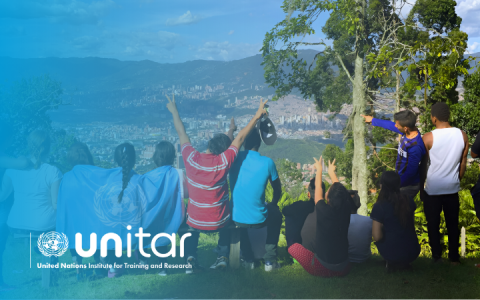
UNITAR Online Catalogue
Youth and Peacebuilding - PTP.2025.22.UPD

Peace
Background
The United Nations Security Council unanimously adopted Resolution 2250 on Youth, Peace and Security on 09 December 2015. This landmark resolution recognizes the positive contributions of young people to international peace and security. It affirms the crucial role of youth in conflict prevention and resolution, calling for their engagement as partners and leaders in decision-making and peacebuilding processes.
This course provides a comprehensive training on youth involvement in peacebuilding. It equips participants with the knowledge and skills necessary to translate Resolution 2250, and the subsequent resolutions relating to the Youth, Peace and Security agenda, from UN policy into actionable change on the ground. By engaging with this course, learners will gain a deeper understanding of their role in peace and security initiatives and develop the capacity to contribute effectively to peacebuilding efforts worldwide.
Event Objectives
The course enables learners from around the globe to better understand the current situation of youth in complex contexts, their needs, challenges, and potential; as well as to explore possible entry points for young people’s involvement in peacebuilding activities and strategies.
Through two parallel tracks, one for young people and another for youth partners (relevant decision-makers and youth supporters), the course provides participants with the opportunity to develop strategies for youth empowerment and serves to enhance basic skills that are critical to successfully contribute to peacebuilding processes.
Learning Objectives
At the end of this course, learners will be able to:
- Understand the global context of youth involvement in peace and security, including UN initiatives and resolutions,
- Analyze the impact of conflicts on youth and identify factors that influence youth engagement in violence or peacebuilding,
- Identify the different roles of youth as actors in peacebuilding processes,
- Apply key concepts and best practices in youth peacebuilding project design and implementation,
- Navigate the challenges and opportunities for youth participation in local, national, and international peacebuilding efforts,
- Understand the importance of supporting and integrating youth initiatives across various phases of peacebuilding projects,
- Recognize the value of advocacy and community engagement in enhancing youth involvement in peace processes,
- Design, plan, and evaluate youth-led peacebuilding initiatives,
- Critically assess existing youth peacebuilding projects and identify opportunities for improvement and innovation in terms of strengthening youth participation and youth-responsive outcomes.
Content and Structure
This course offers two specialized tracks:
- One for youth actively engaged in or wanting to learn about peacebuilding efforts.
- One for professionals and policymakers who want to better support youth in peace and security contexts.
Both tracks share common foundational modules while offering specialized content in later modules.
Youth Track
- Module 1: Youth, Peace, and the UN
Introduces key concepts of youth, peace, and UN initiatives in this field.
- Module 2: Conflict's Impact on Youth
Explores how conflicts affect young people and the factors influencing youth engagement in violence.
- Module 3: Youth as Peacebuilding Actors
Examines the role of youth in peacebuilding and approaches to effectively involve youth in peace.
- Module 4: Youth Peacebuilding in Practice
Focuses on practical aspects of youth-led peacebuilding projects and personal development.
- Module 5: Designing Youth Initiatives
Provides tools for planning, monitoring, and evaluating youth-led peacebuilding projects.
Youth Partners’ Track
- Module 1: Youth, Peace, and the UN
Introduces key concepts of youth, peace, and UN initiatives in this field.
- Module 2: Conflict's Impact on Youth
Explores how conflicts affect young people and factors influencing youth engagement.
- Module 3: Youth as Peacebuilding Actors
Examines the role of youth in peacebuilding and approaches to effectively involve youth in peace.
- Module 4: Supporting Youth Peacebuilding
Covers best practices for integrating youth in peacebuilding and understanding their engagement.
- Module 5: Facilitating Youth Initiatives
Explores ways to support youth projects, including advocacy and project cycle management.
Methodology
Duration: Approximately 16 hours for each track (self-paced).
Structure: Each track comprises 5 modules, of 9 chapters in total. Materials are presented in text format, visual aids and web-based resources.
Assessments: Short quizzes at the end of each chapter, in addition to a final assessment.
Certification: Successful participants will receive a certificate of completion recognizing their achievement.
Targeted Audience
This course is for you if you are:
- A young person interested in or actively involved in peacebuilding and conflict resolution initiatives,
- A professional, policymaker, or community leader, working with or aiming to work with youth in peace and security contexts,
- A representative of a civil society organization, or an international organization focusing on youth empowerment and peacebuilding programs,
- An educator, trainer, or researcher in the fields of peace studies, conflict resolution, or youth empowerment,
- A donor, funder, or decision-maker interested in understanding and supporting youth-focused peace initiatives.
Additional Information
Accessibility
You can access the course:
- Online via our interactive platform.
- Offline through downloading the SCORM packages of each module.
- Through a screen-reading tool by downloading the PDF version.
Technical Requirements
UNITAR recommends the following as a minimum in hardware and software to take our e-Learning courses. Please consult your Network Administrator or Systems person to ensure that you have the following:
Hardware requirements
- Desktop or laptop computer with Windows 10 or MacOS version 11 and later
- Tablet or mobile devices are not fully supported on some course tools
- Stable LAN or Wifi Internet connection
Browser
- Latest version of Mozilla Firefox (download for free at https://www.mozilla.org)
- Latest version of Google Chrome (download for free at https://www.google.com/chrome)
- Microsoft Edge or Safari (included in your computer)
Other software
- PDF reader (download for free at https://get.adobe.com/uk/reader)
- Microsoft Office for Windows or MacOS (compatible software can be downloaded at http://www.openoffice.org/)
- Video player (Quicktime for MacOS, Windows Media Player or compatible video player)
- Anti-virus
Other requirements
- Disable Pop-up blockers
- Enable cookies and java
- Webcam and audio headset for courses that will require online meetings
- Additional storage in case you need to download course materials.